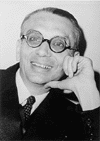 Categories: Do You Know?
Categories: Do You Know?
The Gödel's Theorem
Kurt Gödel (1906-1978) was born in Brunn (now Brno), in what is now the Czech Republic. He studied physics in Vienna, and emigrated to the US in 1939, where he took a position at Princeton's Institute for Advanced Study. In addition to other honours, in 1975 he was awarded the National Medal of Science, the US government's highest scientific honour.
He was noted for his contributions to the foundations of logic and mathematics. In a celebrated paper published in 1931, Gödel first put forward what came to be known simply as "Gödel's Theorem". With this theorem, Gödel had effectively demonstrated that some mathematical propositions are undecidable. Gödel's Theorem made a deep impact in the fields of mathematics and logic, and has been called the most significant mathematical truth of the 20th century.
Gödel's (Incompleteness) Theorem states that you cannot formulate a finite system of axioms to prove every result in mathematics. Inconsistencies can arise if you try to prove statements that refer to themselves.
One of the most famous of these is the assertion "This statement is false." If the statement is true, then according to the statement itself, the statement is false. But if the statement is false, then the statement must be true.
Another more interesting and of theological significant - the theological parallel in the Problem of Evil: God doesn't exist since an ultimate ruler must be responsible for all things but a perfectly just being wouldn't be responsible for evil acts.
Actually this doesn't prove divine nonexistence: just that certain notions of being "ultimately responsible" and being "perfectly just" are inconsistent. Being ultimately responsible is a form of strength like being able to encode sequences of numbers. Being just is like the property of being self-consistent (inconsistency is the sole mathematical evil). As with diagonal arguments, you can't have both.
References:
1. Discover Magazine Vol 26 No 10
2. http://www.nas.edu/history/members/godel.html
3. http://www.math.hawaii.edu/~dale/godel/godel.html#FirstIncompleteness
4. http://godel.4mg.com/ (unfortunately some links are broken)
5. http://www.myrkul.org/recent/godel.htm
6. http://www.exploratorium.edu/complexity/CompLexicon/godel.html
7. http://en.wikipedia.org/wiki/Godel
8. http://www.chaos.org.uk/~eddy/math/Godel.html
Tuesday, December 06, 2005
Do you know........?
Posted by
Wormie
at
14:16
![]()
Subscribe to:
Post Comments (Atom)





No comments:
Post a Comment